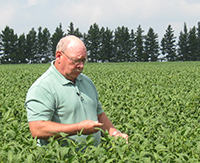
Dr. Dave Franzen
Professor, Extension Soil Specialist
NDSU, Dept 7180
Fargo, ND 58108-6050
Office/Cell:701-799-2565
FAX:701-231-6186
Email: david.franzen@ndsu.edu
Background:
BS, MS, and Ph.D. from University of Illinois, Urbana, IL. 18 years as agronomist and manager in the retail fertilizer business in East Central Illinois. Completed Ph.D. in 1993, with thesis addressing field variability of P, K, and soil pH in two Illinois fields. Results are published and publications are listed on this page. Joined NDSU faculty in June, 1994.
Professional Duties:
Provide educational programs on soil and soil fertility topics to extension agents and specialists, industry professionals, farm producers and the public. Material is presented using meetings, field tours, written material, radio, TV, video and internet resources. Perform applied soils research projects as are relevant to North Dakota producers.
Research Interests:
Site-specific Nutrient Management
I was hired in June, 1993 as Extension Soil Specialist in spite of my background in precision agriculture, corn and soybean production and tile drainage. Now, most of my presentations and research activities are in these areas. My previous Illinois research indicated that it took about 1 soil sample per acre in a grid pattern to depict the soil nutrient (P, K, soil pH) patterns in a field. My work in North Dakota resulted in the same conclusion. A 2 ½ acre grid in the ‘I’ states is only ‘successful’ because the values are mostly in the ‘high’ range, and although variability is present at a smaller spatial scale, the recommendation for P, K is the same; soil pH being the exception. (more)
Soil fertility research
Modern N recommendations are now available through Extension publications and on web-based N calculators and phone apps for corn, spring wheat/durum, and sunflower. The basis for these new recommendations are based on hundreds of site-years of data mostly conducted since 2005. The recommendations are not yield-goal based. I found that similar N rates are required in a low yielding environment as in a high yielding environment due to low N mineralization rates and N up-take efficiency in low-yielding environments, and high N mineralization rates and highly efficient N up-take in high-yielding environments. (more)
Scientific Publications
Extension Publications and Programs
Peer-reviewed proceedings paper/book chapter
Presentations:
- Demystifiing Soils and Fertilizers
- Increasing Fertilizer Efficiency
- CCA Training 2014 - Nutrient Management
- The History of Soil Erosion in North Dakota
- End of Yield-Goal Based Fertilizer Recommendations
Links:
Iowa State Compendium of Non-conventional Soil Additives and Amendments
NCERA-13- North Central Research Activities